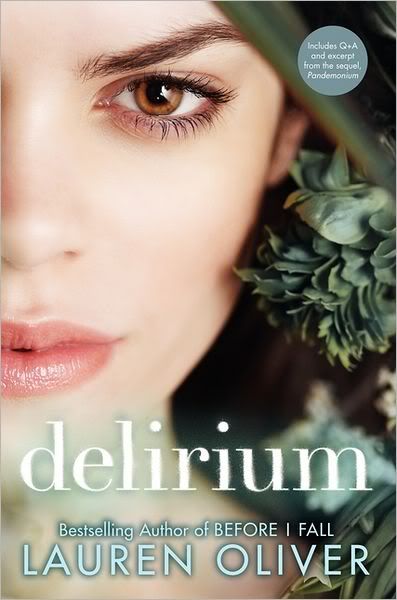
Ninety-five days, and then I’ll be safe.
I wonder whether the procedure will hurt.
I want to get it over with.
It’s hard to be patient.
It’s hard not to be afraid while I’m still uncured, though so far the deliria hasn’t touched me yet.
Still, I worry.
They say that in the old days, love drove people to madness.
The deadliest of all deadly things: It kills you both when you have it and when you don’t.
Lauren Oliver astonished readers with her stunning debut, Before I Fall. In a starred review, Publishers Weekly called it “raw, emotional, and, at times, beautiful. An end as brave as it is heartbreaking.” Her much-awaited second novel fulfills her promise as an exceptionally talented and versatile writer.
"Symptoms of Amore Deliria Nervosa
...
PHASE THREE
difficulty breathing
pain in chest, throat, or stomach
difficulty swallowing; refusal to eat
complete breakdown of rational faculties; erratic behavior; violent
thoughts and fantasies; hallucinations and delusions
PHASE FOUR (FATAL)
emotional or physical paralysis (partial or total)
death
If you fear that you or someone you know may have contracted deliria, please
call the emergency line toll-free at 1-800-PREVENT to discuss immediate
intake and treatment."-Chapter Ten, Delirium by Lauren Oliver
I was delighted to finally finish Delirum by Lauren Oliver. It can easily be one of the best dystopian reads this year!
The premise of this novel which paint's love as the disease, Amor Deliria Nervosa, to be challenged by governments and then 'cured,' is one of the freshest depictions of love that I've read in a long time. I often wonder how writers of the dystopian genre, decide on what to make 'the enemy.' The synopsis easily drew me in as a story I wanted to sink into.
Lena's character is translucent, in that anyone can read and embody her struggles, yet she has a rounded, rich fire that grows as the story moves forward. I enjoyed discovering the intricacies and secrets that this new form of United States government harbored against its people. Oliver layered this world in such a specific way that you will easily believe every word she has to write on it. Her interactions with her best friend Hana, where both sympathetic and intriguing as Hana serves to be a catalyst to Lena's discoveries. It was beautiful to see such a close knit friendship thrive in a world where love is all but eradicated.
Alex is the guy that many of us dream of knowing because he is full of life, not predictable. I loved how Oliver painted him as being a representative of the love that Lena finds hard to understand after tragedy has touched her life. He distracts and throws Lena off of her desire to simply blend in and make all of the right choices. Their romance could be one of the great loves in dystopian literature! I drank in all of the romantic scenes, and fell in love with Alex as Lena did.
I adored Oliver's infusion of banned books, literature, and slight allusions to music! This was made all the more interesting by my finishing the novel during Banned Books Week. It was beautiful to watch on as Alex introduces Lena to poetry by Elizabeth Barrett Browning and William Shakespeare. This novel has the allure and intrigue of reading something that you're not supposed to, and thus desiring it all the more. Oliver beautifully interweaves excerpts of texts known only to the world of this novel, such as The Book of Shhh, thus giving this present day dystopia an authenticity that I appreciated. The text's cited were of such specificity that I couldn't help but shake my head at the genius Oliver employed. Her writing is so beautiful, and I found myself wanting to underline so much of what I saw on love.
This novel really made me think, and at some point made me wonder whether those enemies seeking to eradicate love weren't right in their diagnosis that love taints the mind in delusion. Nevertheless, by the end, I joined in with the fight of sympathizers (all those who decide against 'the cure') and decided that even with it's challenge and pain, love is worth every fight!
EDIT: As I mentioned earlier, Oliver went to great lengths to solidify the credibility of Lena's world. She invented texts, some that didn't exist, which I thought was pretty awesome. But she did, however, take certain aspects of the Bible, such as the Genesis account of the fall of man, and Mary Magdalene's account, and change it to suit the novel. Upon first read, I didn't feel as if this was done to be offensive, I felt that it was done to highlight how far a government, or group of people, will go to enslave a persons mind. But, I'll admit that I feel a bit chagrinned by it, no matter how small it was an addition. This has not changed my original opinion of the novel being wonderful, but I felt I should mention this, so that those who may be sensitive to these matters may understand what they will encounter.



